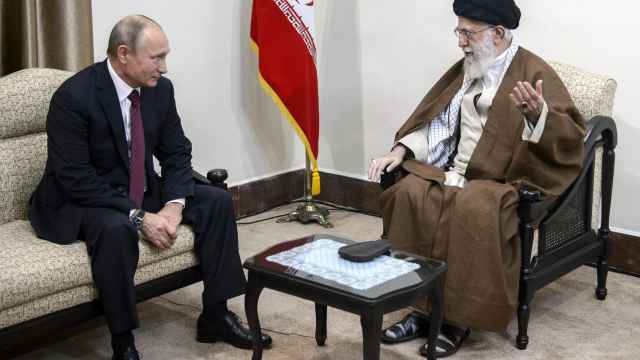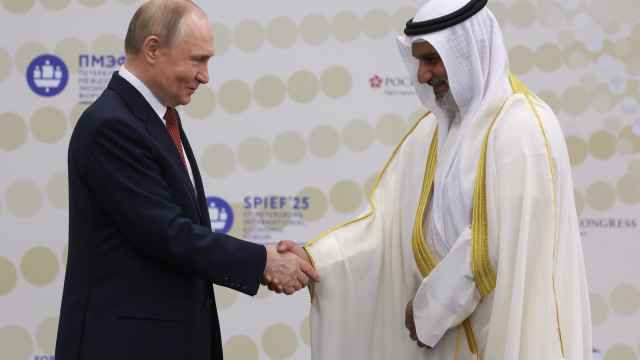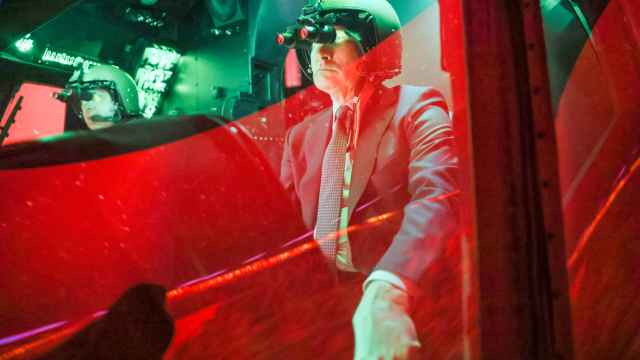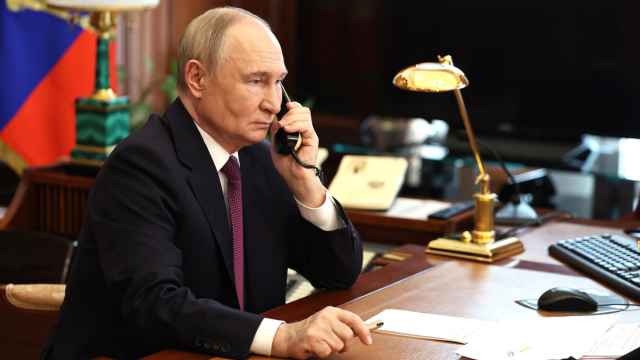Ousted Finance Minister Alexei Kudrin said Tuesday that his resignation was not spontaneous and acknowledged that it was directly linked to the weekend announcement by Prime Minister Vladimir Putin and President Dmitry Medvedev that they would swap jobs next year.
Kudrin's resignation — which investors and analysts have said will make Russia more vulnerable to future economic crises — on Monday night followed a televised spat with Medvedev.
Kudrin, 50, who is much admired for his tight grasp on the fiscal reigns, said in a statement that he had been increasingly disturbed by the risks posed to Russia's budget by social and defense spending and discussed his resignation with Putin in February. "Emotion was neither here nor there," he said.
He added that he had chosen this time to make his position clear because of last weekend's United Russia convention, where the ruling tandem revealed they would swap jobs. "On Sept. 24 the structures of power in our country were defined for the long term," he said.
In a stopgap solution, Putin announced at a Presidium meeting Tuesday that Kudrin would be temporarily replaced at the Finance Ministry by one of his deputies, Anton Siluanov, and represented by Deputy Prime Minister Igor Shuvalov in the Cabinet. Medvedev had been consulted about the changes, he said.
But Putin did not offer assurances that the replacements would defend Kudrin's trademark fiscal caution and, before revealing the Cabinet realignment, appeared to side with Medvedev in condemning any acts of insubordination.
"The country has entered a campaign period," Putin said, referring to the upcoming presidential and parliamentary elections. "I ask all of you to execute your service duties decently — and enhance your discipline and responsibility — until the formation of a new Cabinet begins."
Kudrin, who was widely tipped to become prime minister under a Putin presidency, riled Medvedev twice in three days. On the sidelines of a IMF and World Bank gathering in Washington on Saturday, he said he would not serve under Medvedev as prime minister, and then he appeared to publicly question Medvedev's authority at a meeting when Medvedev demanded an apology or his resignation.
The former finance minister has a close personal relationship with Putin. In the 1990s, Kudrin was head of the General Control Office in President Boris Yeltsin's administration and helped Putin to find a job under Yeltsin. There are few who expect him to disappear from frontline politics.
VTB chief Andrei Kostin said Tuesday that now that he had left government, Kudrin could become head of the Central Bank, Bloomberg reported.
Medvedev, who stressed in the televised confrontation with Kudrin that his presidential authority will run until May 7, 2012, hit back at the main reason given by Kudrin for his inability to serve under Medvedev — his support of a $65 billion increase in military spending through 2014. "We can't manage without defense expenditure," Medvedev said. "[They should be] expenditures worthy of the Russian Federation — not some sort of 'banana republic,'" RIA-Novosti reported.
Kudrin, whose relationship with Medvedev is widely known for its occasional tensions, further irked the Kremlin when he described the Cause party in his statement as an "artificial project." Interfax carried subsequent remarks from a "highly placed Kremlin source" who said it was possible to respect Kudrin's position with the exception of his comment about Right Cause. "Mr. Kudrin seriously looked at the possibility of leading Right Cause and at that moment it certainly didn't appear to him to be an 'artificial project,'" the source said.
But the high-level mudslinging and abrupt exit of one of the Cabinet's most respected ministers confounded the predictions of many analysts by not provoking any noticeable reaction on either of Moscow's bourses.
The MICEX Index closed up 2.5 percent at 1,380.42, and the RTS Index rose 4.2 percent to 1,369.93. The ruble broke a long decline Tuesday, closing up at 32.4 rubles to the dollar and 43.5 rubles to the euro. The positive reaction on Russian stock exchanges was in line with international equity gains Tuesday.
A statement from the head of the Central Bank, Sergei Ignatyev, that the bank had sold more than $6 billion worth of rubles in September buoyed the climb for Russia's currency, Bloomberg reported.
The chief economist at Otkritie Capital, Vladimir Tikhomirov, said: "The global situation carries much more fundamental and higher risks for Russia … than the fact that one minister in the Russian government lost his job."
VTB Capital said in a research note that Kudrin's departure might actually be a positive development for markets, if it prompted a more rapid than expected clarification on the key players of the next administration. But other experts stressed that the absence of a strong figure at the helm of the Finance Ministry — particularly in an election season when other ministries would be pushing for expensive populist measures — would ultimately have serious consequences.
"Kudrin was a stable, predictable factor and investors are clearly not happy with what has happened," said Thomas Farthofer, a manager at Griffin Capital Management, who added that his clients and those of other investment funds would be put off by the political strife.
"Ahead of us is a relaxation of budget politics, a greater buildup of state expenditure, an increase in the dependency of the budget on the price of oil and a big budget deficit," Yulia Tseplyayeva, chief economist for Russia and CIS at BNP Paribas, told The Moscow Times.
The acting finance minister, Siluanov, has yet to be seriously tested in the political spotlight. Siluanov has been deputy finance minister since 2005.
"You don't just need a professional person — there are a lot of those — but a person who has a significant political weight," Tseplyayeva said.
Even despite Kudrin and his fiscal prudence, the price of oil that is required for a balanced budget has increased almost threefold from 2008 to $109 a barrel. Revenue from duties on energy sales makes up almost 40 percent of Russia's federal revenues.
Some observers have predicted that the resignation of the veteran finance minister is only the beginning of an upheaval in Russian politics.
Writing on his blog Tuesday, Mikhail Prokhorov — Russia's third richest man who recently stood down as Right Cause leader — said more resignations at the top of the government were likely. "We are standing on the threshold of very important — possibly tectonic — movements in the consciousness of the elite," he said.
A Message from The Moscow Times:
Dear readers,
We are facing unprecedented challenges. Russia's Prosecutor General's Office has designated The Moscow Times as an "undesirable" organization, criminalizing our work and putting our staff at risk of prosecution. This follows our earlier unjust labeling as a "foreign agent."
These actions are direct attempts to silence independent journalism in Russia. The authorities claim our work "discredits the decisions of the Russian leadership." We see things differently: we strive to provide accurate, unbiased reporting on Russia.
We, the journalists of The Moscow Times, refuse to be silenced. But to continue our work, we need your help.
Your support, no matter how small, makes a world of difference. If you can, please support us monthly starting from just $2. It's quick to set up, and every contribution makes a significant impact.
By supporting The Moscow Times, you're defending open, independent journalism in the face of repression. Thank you for standing with us.
Remind me later.






